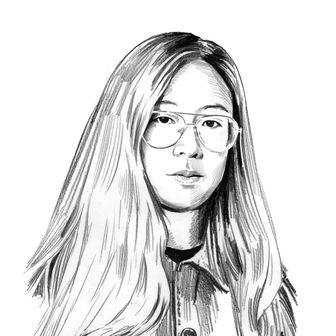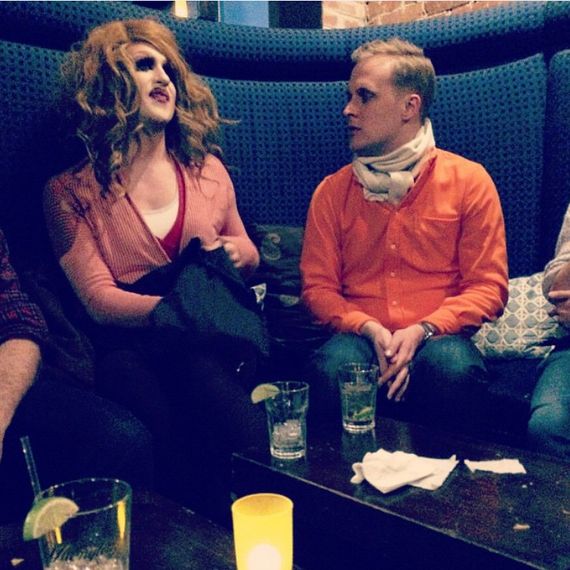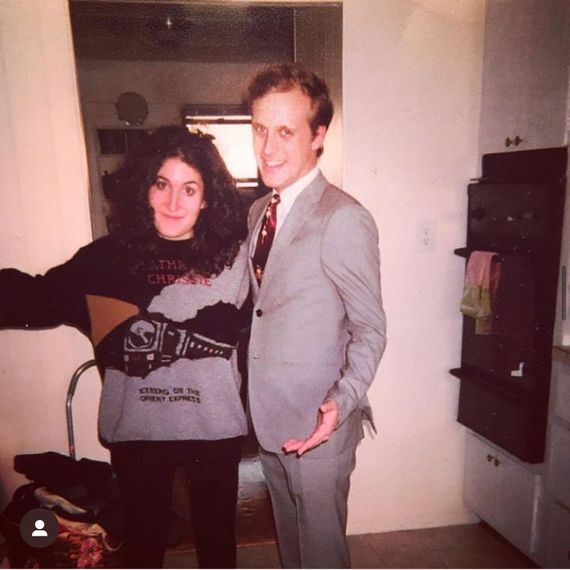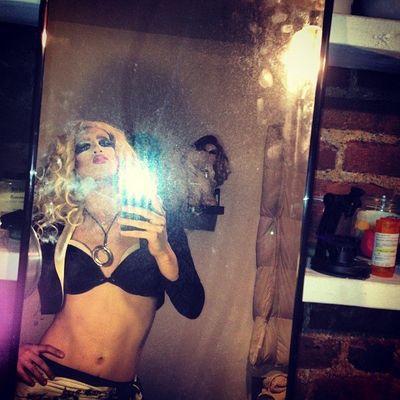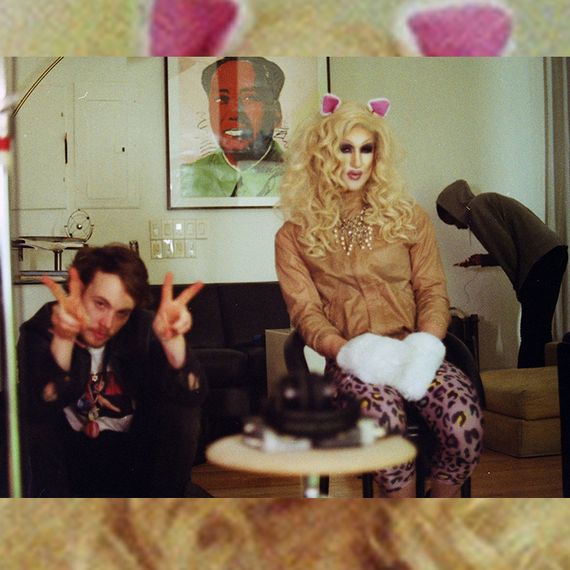
Nearly all of Theda Hammel’s film Stress Positions takes place in an instantly familiar kind of Bed-Stuy brownstone: The apartments are dark and awkwardly chopped up; the backyard is a classic dirt pit. It’s the early days of COVID, and Terry Goon (John Early) is living on the garden and parlor floors of this former party house, owned by his soon-to-be ex-husband Leo (John Roberts), along with his nephew, Bahlul (Qaher Harhash), a model who is moderately bedbound with a full-leg cast. On the top floor is the strange and silent neighbor, Coco (Rebecca FWright), who came with the building. They are squeezed together by lockdown but also by circumstance, and they spend their time Lysol-ing surfaces and slowly going insane as they try to figure out how to relate to one another and themselves. They mostly fail and act incredibly annoying in the process, but isn’t it still the reason we come to New York? Or stay here? Which is what the movie is also about. So we talked to the actors about their own early days in the city — Hammel’s feelings about Sunac, Early’s Ars Nova shows, and FWright’s Studio 54 and Turkish-figs era.
John Early
I came to New York from Nashville as an NYU freshman. I hadn’t worn my retainer for the entirety of my senior year of high school and the gaps had come back into my teeth. So the night before I moved to New York, I tried to cram my retainer in at the last minute. I stuck it in my mouth and didn’t sleep at all just due to the very intense pain. I got here a couple of weeks before NYU to do the New York Fringe Festival with this weird Nashville masked theater troupe. We performed at Classic Stage Company and there was the little Ninth Street Espresso in the lobby so I felt very chic doing that. My friend’s uncle is the actor Reed Birney, and his wife is Connie Shulman, who plays the voice of Patty Mayonnaise, so I was staying with them for two weeks in their Upper West Side apartment.
Then I moved downtown to my dorm. Once I got to my dorm and I was with five straight guys as roommates, I immediately had some sort of anxiety reaction and all the muscles on the back of my body, like from my head, neck, back, ass, legs, all the way down to my feet, seized up. I literally couldn’t walk. They were all looking at me like, “You okay, man?” And I was just like, “I’m good.” And I was just in my bed. I couldn’t move. It was really strange.
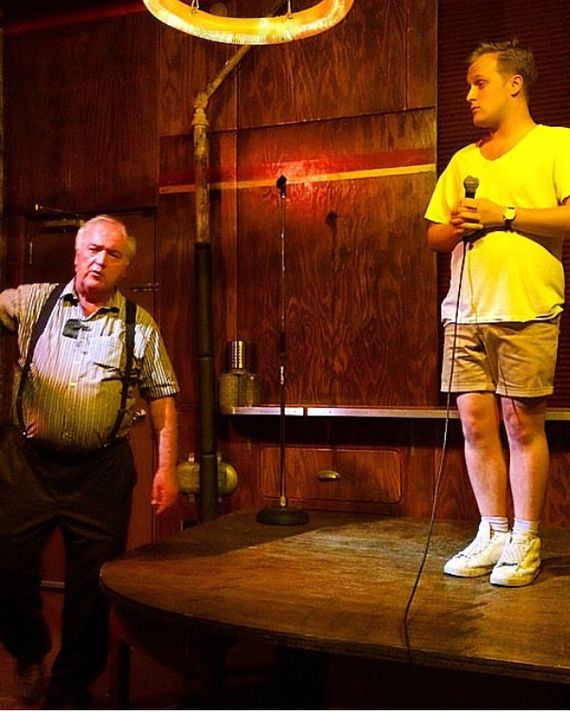
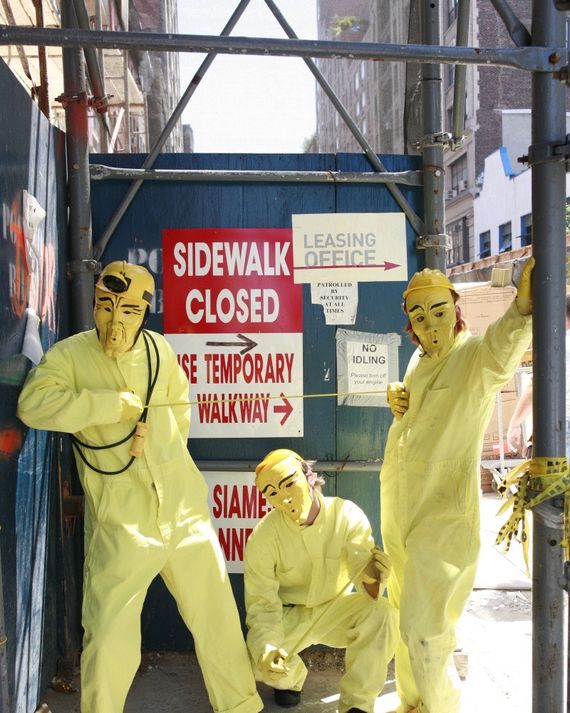
What’s so sad about my early days in New York is that, like so many NYU freshmen, I just accepted the offerings that were directly catered to me, places that were made for stoned freshmen from the heartland — Insomnia Cookies, the Quiznos station in my dining hall. But I was very determined to live a kind of romantic New York life. I just didn’t really know how because it already seemed to be gone. It was the time of American Apparel V-necks.
Then after graduating, like everyone my age at that time, I fled to Brooklyn. I was in Lefferts Gardens right on Prospect Park. I had a roommate who was a lesbian minister, and she had a dog and we had a sweet little domestic life. I would walk the dog in the park and do the big gigantic loop, and that finally felt better to me than what I had experienced in Manhattan, which was just Chipotle all the time. My rent was $600, and I loved living there. It was technically a one-bedroom that we turned into a two-bedroom by making the living room a bedroom. It was the second floor of a really big, thick kind of co-op-style building with very sad fluorescent light. I lived there for seven years. I was kind of inside a lot and would go between there and the park. I was doing a lot of my own cooking, and I didn’t have the money to go to restaurants. There was lots of weed, so I would just make these really rich pimento-cheese grilled sandwiches.
That’s when I started doing comedy and Theda and I started doing our variety show in midtown. I have very fond memories of us doing “Showgasm” at Ars Nova and coming back to Brooklyn after. I would go to Theda’s shows in the nightlife world and get really, really drunk off drink tickets and end up going home and ordering an entire pizza.
I was also traipsing around Brooklyn with Kate Berlant, and she also gave me a jolt of the romance I had been lacking. She was a good curator of experiences, and I was just kind of following her around like a little golden retriever. With Kate, the drama of returning a cocktail that’s too sweet or something became the drama of the entire dinner. And I have lots of general memories of just crippling anxiety at meals because of her trying to get me to work up the courage to return something I didn’t like.
Rebecca FWright
I’m a Manhattan girl, mostly in the East Village. In the old days, you could smell, taste, feel, and fuck the making of the bread — that’s what New York was about. It was the only place for people in the arts and people who didn’t have family values, everyone from the gay spectrum. There was romance, there was danger. The two go together. I go back from the time where every apartment was a piece of shit and you could move every two weeks if you wanted. It didn’t matter if your apartment was nice since you were out all the time. Nothing was renovated, it was all shit and very DIY. But you could also get an Entenmann’s blackout chocolate cake for $1.50.
The big difference was the nightlife. We lived in the night and we dressed and went out to just dance a little while and be fabulous. There’s no way anybody was going to stand on a line. The original Studio 54 was divine. The Peppermint Lounge, they had rocksteady b-boys standing on the scaffold above the stage doing a dead man’s drop to the dance floor. So that was incredible. The music clubs, there were like seven right near here. None of them are here now. The culture was thick. Also, the things you could buy to eat, like the Turkish figs, the quality of the fresh-off-the-boat-ness. On 28th Street, there would be like ten stores and cheap.
We were out all the time. My dearest friend was a vintage dealer, and we would walk down old, rich Park Avenue at night and he would see a garbage bag and see through it with his magic vision and pull out a haute gown. He loved to put things on me. Then we would take a Checker cab and go to a discothèque.
My boyfriend turned me on to Phil Black, who’s a great choreographer. In those days, people had their own studios. And he knew I was a natural, and I fell in love with it and was training to dance on Broadway. I also went to Salvador Juarez, who taught Russian ballet, and he taught us to fly across the floor. This studio was 55th and 56th on Eighth Avenue with the old wooden staircases and the echo, and the windows were high and rattling. There were only like six very dedicated people there. And it was all a matter of life and death — you had to do what you needed to do. I have very fond memories of these great people.
Theda Hammel
My time in New York was totally corrupt from beginning to end. I came here under corrupt pretenses, meaning I went to college here and then I moved to Williamsburg. And I stayed in Williamsburg for 11 years because I was in a reasonably affordable two-bedroom apartment — the rent hovered around $2,000 — with a succession of roommates. It was a railroad, so I spent the first half of the 2010s in the darker, bigger room and then I switched to the other side of the apartment, which was a smaller but brighter room. I just wanted any change. But change within the apartment, not change as in changing my apartment, which I didn’t have the courage to do. So that apartment was a kind of tomb.
I did have a car at one point, and there was wonderful parking on Meeker Avenue under the BQE. People were leaving their cars there forever. It’s like everywhere in New York, the feeling of being imprisoned is a result of your fear of losing the little you already have. So if you have a parking spot and you’re sort of close to a subway, you feel like it would be suicidal to move anywhere.
By the time I got to Williamsburg, it was an ecosystem that had already been completely depleted, so there seemed to be a very low risk of gentrification since it had already been totally gentrified. That consoled me a little bit. But it also meant there was never any place where you could reasonably eat food or get coffee or do anything during the day. For a window of time in the 2010s, there were three gay bars within walking distance of one another, and they were all owned by the same management. The one that currently still exists is Metropolitan, which will probably never go away. There was one very close to my house, called Sugarland, which has been replaced by a condominium — proof that further gentrification is possible. And then there was one by Bedford called This n’ That. That’s the one I most frequented. It was an extraordinary space. It was like a big tunnel, and it felt like it was underground even though it wasn’t. And it didn’t draw in cool people. It was the loser of the three, which is why I felt safe. And because it was newer, I was able to get a Sunday show there as a drag performer. Because Brooklyn drag at that point orbited those three spaces, it seemed to make sense also to just stay there. And I did that for four years.
I was mostly active at night as a nightlife performer and then I trawled in John’s wake in my late 20s by going to graduate school, another corrupt and corrupting activity for somebody in my demographic. Something had to be done to kill time, and so I went to NYU for three years.
I had a special loathing for Sunac, the supermarket. Every single time I was at Sunac they were playing Pink. It was open 24 hours a day and had a decent premade shrimp cocktail that’s probably given me mercury poisoning, so I was always there. Everything was totally overpriced, and I ate so much from there. I never figured out how to shop, how to prepare food for myself, how to even clean a kitchen after using it. So I spent a lot of time at Sunac despising it, eating the shrimp cocktail, and having a kombucha — another evil substance that boomed in those years.
The interviews have been edited and condensed for clarity.


